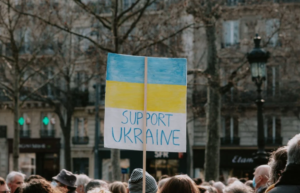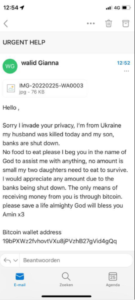FBI warns of fake charities impersonating legitimate Ukrainian humanitarian organizations
Scammers are exploiting the war in Ukraine by impersonating legitimate Ukrainian humanitarian organizations. Time after time have scammers taken advantage of crises and people’s generosity during a time of need. We saw this happen during the worldwide COVID-19 pandemic when scammers launched various campaigns to lure money from people. And just like with any crisis, cybercriminals are taking advantage of the war in Ukraine to steal money.
Major crises often bring people together but they’re also a great opportunity for malicious actors to make money. At a time when people from all over the world are showing support for the Ukrainian people, scammers are impersonating humanitarian organizations helping Ukrainian refugees and war victims. The Federal Bureau of Investigation (FBI) has issued a warning to people who wish to donate to support Ukraine in its time of great need, recommending caution when making a donation.
“Criminal actors are taking advantage of the crisis in Ukraine by posing as Ukrainian entities needing humanitarian aid or developing fundraising efforts, including monetary and cryptocurrency donations,” the FBI’s Public Service Announcement reads.
Anit-virus vendor ESET has also warned people of scams exploiting the war in Ukraine. ESET’s report, written just 3 days after Russia invaded Ukraine, already mentions numerous different scams that ask for donations, suggesting scammers waste no time.
A recent post on Reddit highlighted to what extent scammers go to take advantage of people. The post displays an email sent by scammers claiming to be a Ukrainian woman who has lost both her husband and son. The scammer(s) try to use the sympathy card by saying that there is no food and banks are closed. The email asks for donations via Bitcoin. As far as charity scams go, this isn’t a particularly convincing attempt to scam users. The email claims that banks are closed, but asks for donations in Bitcoin. It’s doubtful that paying in Bitcoin for anything in Ukraine at the moment is possible, so to use the donated Bitcoin, the cryptocurrency would have to be converted to Ukrainian hryvnia and transferred to a bank account. And with banks supposedly being closed, withdrawing money from a bank account would not be possible. Fortunately, it appears that no transactions have been made to this particular Bitcoin address.
Similar emails may come from senders claiming to be from various organizations and charities. If you receive an email from a supposed humanitarian organization you never donated to before, do not engage with the email or donate money using the details in it. Charities and humanitarian organizations do not make unsolicited contact with potential donators, so unless you sign up for a newsletter or some kind of reminder, you will not receive emails from such organizations.
We also previously wrote about scammers asking for donations to supposedly support the Armed Forces of Ukraine. But it also seems that no one has fallen for this scam as no transactions have been made to the Bitcoin addresses.
How to protect yourself from charity fraud
- Before you make a donation to any charity, you need to make sure that the charity is reliable.
Avoid donating to unknown people/charities, particularly when scammers are very active due to a crisis. It’s best to stick to well-known organizations or at least ones that have proof of legitimacy. For example, if a known activist starts a charity to help those suffering from the Russian invasion, you can be certain that your money will not go to scammers.
- Be skeptical of donation requests using gift cards.
Obviously, gift cards have no use during a crisis, so legitimate charities and humanitarian organizations will never request that you make a donation using gift cards. Cryptocurrency requests should also cause suspicion but this isn’t an impossible request. Official sources should be checked to make sure the donation requests are legitimate.
- Do not click on links in emails or open attachments.
Avoid clicking on any links or email attachments, especially if the emails come from unknown senders. Links could lead to phishing websites, while email attachments could result in a malware infection.
The FBI also provides tips on how to protect yourself:
- Be suspicious of online communications claiming to be individuals affected by the conflict in Ukraine and seeking immediate financial assistance.
- Although the Ukrainian Government and other private organizations do maintain official donation mechanisms, be cautious and verify information about entities purporting to solicit aid for causes linked to the crisis in Ukraine. If an entity asks for donations to specific cryptocurrency addresses, be cautious, always carefully check if the addresses are legitimate, and compare the address alphanumeric characters to any known official addresses.
- Do not communicate with or open texts, emails, attachments, or links from unknown individuals posing as Ukrainian entities in need of humanitarian aid.
- Do not send payments to unknown individuals or organizations asking for financial assistance.
- Best practices to verify charities include, but are not limited to, researching the charity online to see if there are news, reviews, or posts linking the charity to fraud; checking to see if the charity is registered with your state’s charity regulator, if available; and checking the Internal Revenue Service’s website (https://www.irs.gov) to see if the charity is registered.
Site Disclaimer
WiperSoft.com is not sponsored, affiliated, linked to or owned by malware developers or distributors that are referred to in this article. The article does NOT endorse or promote malicious programs. The intention behind it is to present useful information that will help users to detect and eliminate malware from their computer by using WiperSoft and/or the manual removal guide.
The article should only be used for educational purposes. If you follow the instructions provided in the article, you agree to be bound by this disclaimer. We do not guarantee that the article will aid you in completely removing the malware from your PC. Malicious programs are constantly developing, which is why it is not always easy or possible to clean the computer by using only the manual removal guide.


